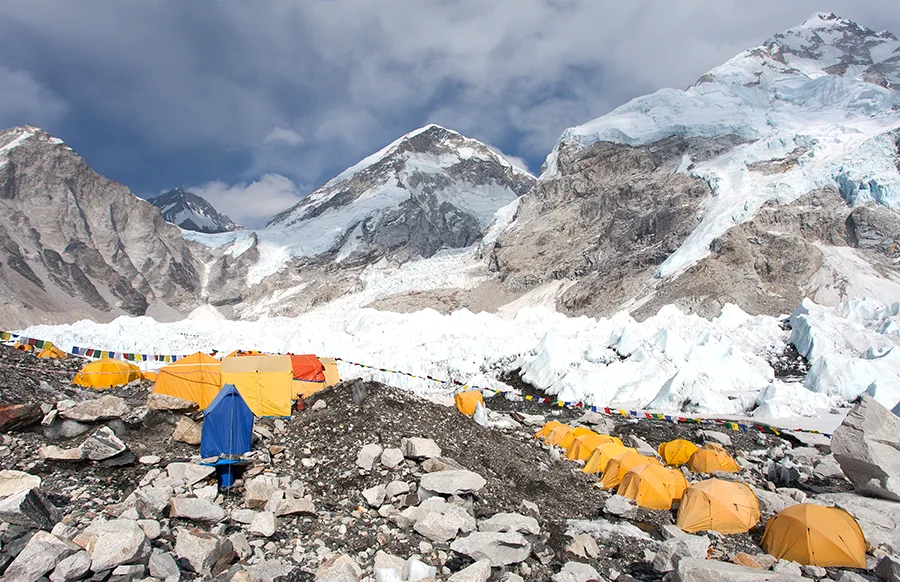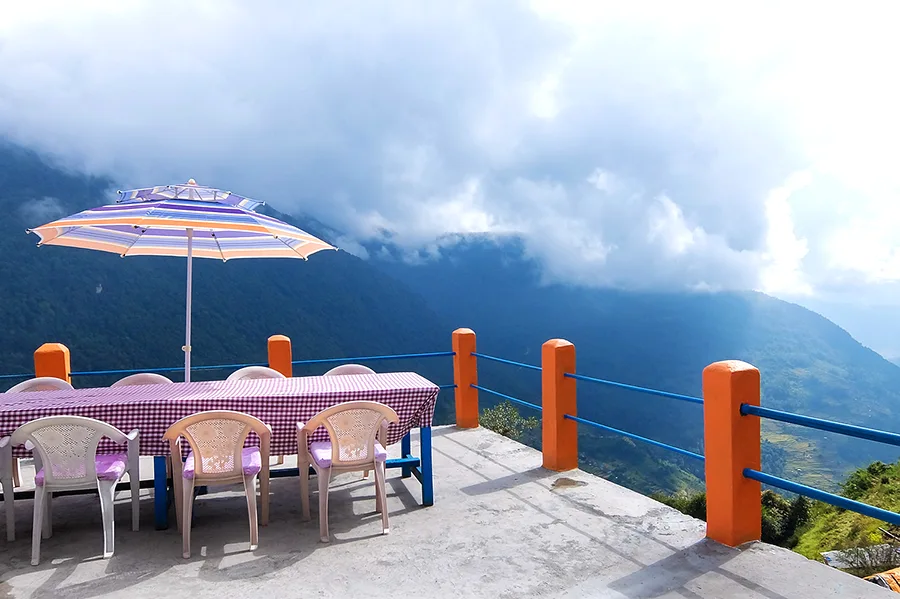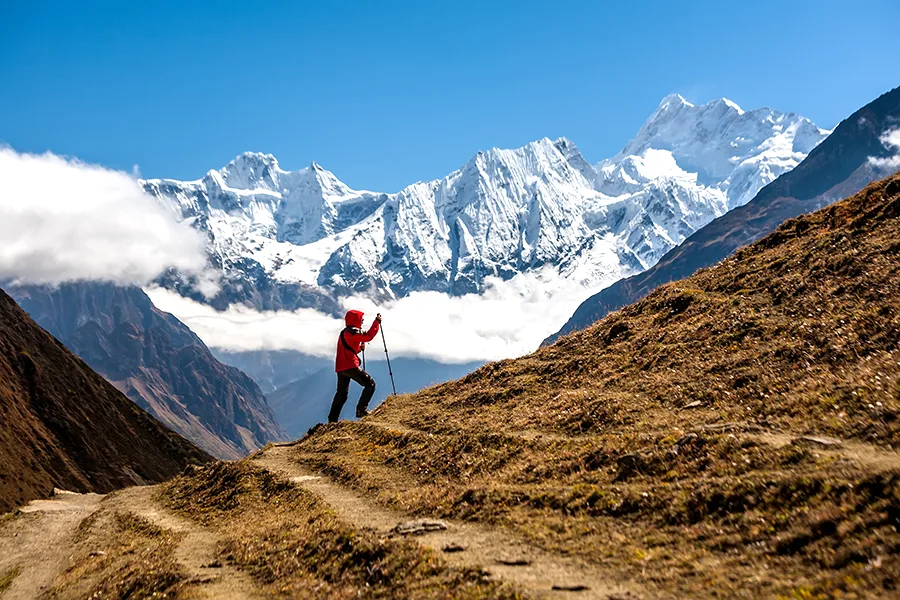Annapurna Base Camp Trek Difficulty
The trek in the Annapurna region is from the south as you make your way up into the world-famous Annapurna Sanctuary. It is the world’s 10th highest mountain which lies in Gandaki Zone in Nepal. This is one of the great treks in the world. Unique and diverse landscapes, the culture of the local ethnic group, and views of the world’s iconic mountains are the main attractions of this trek.
The Annapurna base camp trek offers you beautiful views of the stunning mountain vista from the different attractions and the beautiful viewpoint, which takes you through the terraced field surrounding the village and valley, the charming village of Gurung and Magar, breathtaking views of the Himalayan flora and fauna. This aspect will rejoice you during the adventure walk to the Annapurna Base Camp.
Moreover, besides trekking and doing adventures in ABC we are here discussing the Annapurna Base Camp trek difficulty.

So how difficult is Annapurna Base Camp trek?
Annapurna Base Camp is situated at an altitude of 4130 meters and the route of this trek is one of the most popular and beautiful trekking trails in Nepal after Everest Base camp. It is also very popular for solo and group trekkers experienced trekkers as well.
Annapurna Base Camp trek is not considered to be a difficult trek because this trek is very adventurous and the key factors of the trek are to walk slow and steady. So this trek is considered to be a moderate trek. At Everest Base Camp Trek is also a demanding and beautiful trek but with a bit of patience, this trek is very enjoyable and achievable.
It is the most frequently asked question among the traveler and visitors. So, here are some of the lists why visitors/trekkers feel difficult to trek to Annapurna base camp.
Want to know about the clothing backpack? Here you go for clothing.
- Altitude Sickness
- Weather and Temperature
- Lack of Training
- Budget
- Guide and Porter Difficulty
- Clothing
Altitude Sickness

It is the major problem and a difficult situation in the mountainous region. The atmospheric pressure and the oxygen are lower than the sea level in the higher altitude location. With the thinner level of oxygen and the high altitude, it will take time to adjust to the surrounding environment at such a high altitude.
During altitude sickness, you may get symptoms like nausea, diarrhea, headache, loss of appetite, insomnia, and others. High altitude can be moderate for some trekkers but it can be serious for others.
If you find some symptoms of altitude sickness while making the adventure hike, you should immediately return back to a lower altitude region. Do not ignore these types of symptoms which may result in serious problems or the death of the traveler while trekking to a high altitude.
It is not recommended to drink alcohol at such a high altitude. Though there is some medicine available to prevent altitude sickness, you are suggested to take rest and take precautions rather than medicine.
Weather and Temperature

Weather and Temperature is a major factors that can create a major difficulty in Annapurna base camp trekking. Changes in the temperature drastically are based on the weather, altitude, climate, and seasons. The average temperature at the Annapurna Base Camp region is about 15 to 20 degrees centigrade on a sunny day during the autumn and spring whereas, in the summer, the temperature ranges from 20-25 degrees centigrade.
The temperature is normal and moderate during the daytime or under the sun time. In winter, it is the most dangerous and challenging season in the Annapurna Base Camp Trek. In this season, there is the possibility of heavy snowfall and the temperature can be below 0 and can be decreased to minus 17 degrees centigrade at night time. Autumn is the picking season to trek Annapurna Base Camp because of the good and calm weather conditions in the mountain at this time of the year.
After the Autumn season, the spring season is also the best season to trek in the Annapurna region because the days are very beautiful and charming, we can experience the green and beautiful Himalayan flora and fauna, walk through the green terraced field, with the gorgeous and the heart-touching views of the snow painted mountain peaks.
The best part of trekking in Annapurna Base Camp is you can trek here during the monsoon too as there will be less chance of rainfall in this region. This whole region is rain shaded, so the monsoon does not affect too much while trekking in the Annapurna region. So, before trekking, you should take all the essential and seasonal clothes for the drastic change in weather and temperature.
Lack of Training
The most reliable, legendary, and classical trek is the Annapurna base camp as the route of this trek is not so difficult. However, for the new mountain hikers, it will be a challenging trek. Therefore, the best preparation is needed for the adventure hiking if you are trekking the mountain region for the first time. First of all the trekkers should take 6 weeks of training before making a trip to the Annapurna region to make the body healthy as well as physically and mentally fit and fine.
At the higher altitude walk or the walk-in uphill, even a short period of the walk will make you feel tired. Descending towards the lower region is comparatively easier than ascending uphill to the higher altitude as in the high altitude there is very less amount of oxygen up in the mountains. If you are perfectly trained, you can trek any kind of trekking trial easily. To maintain your fitness, you have to perform difficult work, even simple exercises such as stretching, jogging, swimming, and skipping can be helpful for you.
Budget

The country of Nepal is one of the most inexpensive trekking destinations in the world. However, the price of the goods and things you use will get more expensive as you reach a higher altitude than at a lower altitude. The cost of food and accommodation gets tripled or more than it is at a normal rate due to the lack of good transportation and communication facilities in the mountain region.
Guide and porter difficult
Most trekkers do the trek with a guide but not a porter and there are some trekkers who trek to Annapurna base camp on their own without any guide or porter. Annapurna base camp is absolutely doable without a guide or a porter. However, hiring a guide means you are always on the safer side.
The trek doesn’t involve any technical sections but there are some steep and rugged sections. Also, walking up and down the stone stairs is not so easy. So, hiring a porter is also useful. But if you think that you have good physical conditions, you can carry your backpack on your own.
Clothing
The temperature in the mountainous region changes day to day due to the higher altitude locations from sea level. The mornings are colder for most of the seasons while the daytime is a bit warmer. So, you need to wear clothes according to the weather conditions.
Here are some of the list of clothes that should be carried while trekking to Annapurna base camp:

For Spring and Autumn
- Lightweight hiking shirt
- Full or half Pants/ Trousers
- Hiking underwear
- Thermals
- A pair of good quality trekking shoes
- Wind-cheater Jacket and trousers
- Lightweight down jacket
- A pair of hiking sandals
- Gloves
- Lightweight hiking socks
- Shorts
- Light underwears
- Comfortable Sports Bras (for girls)
- A Sun Hat
- Sunglasses
For Winter
- Warm Shirt and Trousers
- A woolen cap
- A woolen scarf
- Layered clothing
- Lightweight woolen jumper/ sweater
- Down jacket or down vest
- Fleece or wool trousers
- Heavyweight gloves or mittens
- Thermals
- Thermal underwears
For Summer/Monsoon
- Full sleeve trekking Shirt
- Windproof/ waterproof trekking trousers (long)
- Windstopper Jacket (waterproof)
- Anti-leech Socks
- Down Jacket for cold nights
- A Rain jacket
- A Rain Pant
- Waterproof trekking boots

Join the Annapurna region trek:







